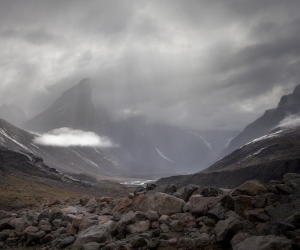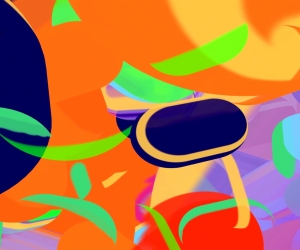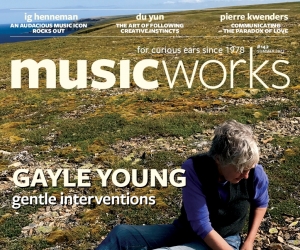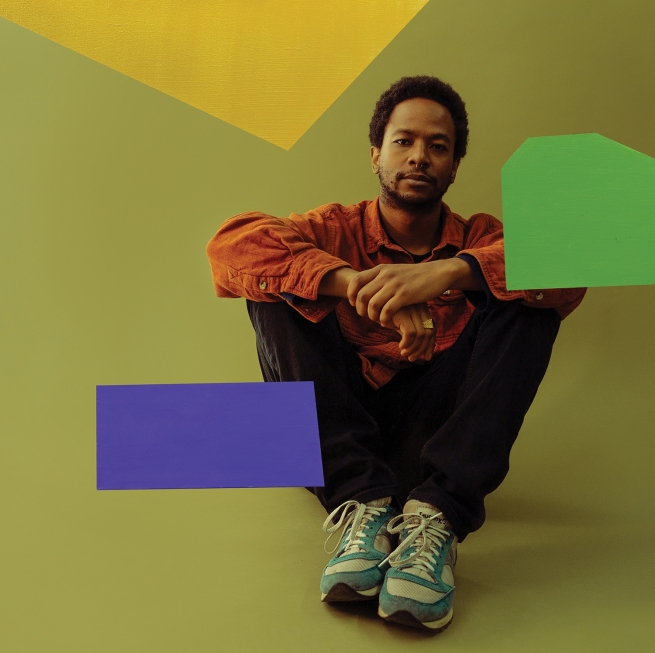
How do you think and write about sound outside of metaphor? Is music necessarily tethered to other aspects of our sensuous and interior lives? Or can we appreciate its meaning more essentially—as energy and dynamics, waves and reverberation? These questions come up around the work of many contemporary musicians working in and around unconventional composition. And they feel particularly suited to exploring the work of Markus Lake, a Montreal-based musician, composer, and visual artist who records under the alias Markus Floats.
Lake has been active in DIY and experimental music scenes for several years—first in Calgary, where he grew up and studied jazz at Mount Royal University, and more recently in Montreal, where he moved to study electroacoustics at Concordia University twelve years ago and has been living ever since. In Montreal, he has played in punk bands and with the eccentric pop project Elle Barbara’s Black Space. His solo work maintains that punk, do-it-yourself ethos that shaped his coming of age—“I’m always rooting for the weirdos and the freaks, the people who don’t really fit in and hate working and are upset that the world is so terrible,” he says—but has tended more towards introspection. On the music blog Weird Canada, one listener commented that the first Markus Floats release, a short-run CD of two tracks released in 2011, was “so nightbus.” It may have been a reference to the Night Bus series of Mike Silver (stage name CFCF), four pensive mixtapes of electronic music. Or maybe it was just another way of giving words to a feeling: music that pulls you into your head as it brings you forward in time.
This tug of motion–emotion feels palpable on all of Markus Floats’s full length releases, titled First Album, Second Album, and Third Album. On each record—their titles aptly suggesting a sense of continuity and progression—Lake’s synthesis summons associations from the very edge of meaning: I see teenage punks spilling out of a venue, disembodied memory swirling around a sleeping subject, pure voltage flowing through an open gate. Third Album, Lake’s debut for Constellation Records, sounds like all of these things, but it mostly just sounds like time itself. It is a burnished, through-composed trip through digital synthesis and field recordings: the pinnacle of his sound work so far, but one that still extends “A special thanks to all the punks” on its colourful sleeve.
Lake says that Markus Floats ostensibly began while he was still in school, practising electric bass and taking courses in jazz composition. “I was not doing [my assignments] properly, but I was really into it,” he says with a laugh. He remembers being tasked with arranging the Herbie Hancock jazz standard “Dolphin Dance” for six instruments, with a solo section, intro, and outro. He pulled apart the tune’s components in a software program used for arranging and found himself making a composition that bore little resemblance to its inspiration. “It just kind of came out as a weird Markus Floats song,” he says. “None of the sections seemed to relate to each other, even though they were all based on the chords of ‘Dolphin Dance’.” His work emerges from that indelible history of music but has grown into something all its own, a testament to newness and the incessant forward march of time.
Funny as Lake’s “Dolphin Dance” anecdote is—he jokes about one day posting his arrangement online—his approach to the assignment gestures towards the intuitive, impressionistic quality that has shaped Markus Floats over the past decade. His work holds onto some of the tenets of his formal education: he says his music is rooted in the “primacy of the chord,” takes guidance from chord extensions and substitutions, and remains inspired by the possibility of creating “arrangements that are technically impossible” with MIDI instrumentation and production software. Of course, the through-composed, minimal compositions on Third Album are distant from jazz—and the many genres that emerged in its wake—in many ways. Lake’s music lacks motif or ostensible melody, beyond the slow slip of an organ drone or cycling of an arpeggiator. But it still remains in that same wake, impressed by the history of music that it nonetheless deviates from.
“I remember [thinking] when I was working on some of these songs, This is kind of an impression of a song; there are aspects of songs in this; there are technically drums but there’s not drumming; there’s piano but it’s not playing a piano part. I like that idea of trying to represent something with something else, that audio metaphor.”
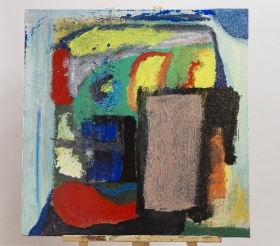
Lake and I spiralled into these questions of impression and metaphor throughout our conversation—a rabbit hole that led us to examine the baggage of representation and the assumptions we bring to acts of listening. I realized that my own listening to his record was buoyed by the visual—Lake himself is a visual artist, after all. The vibrant painting on the cover of Third Album is his own, its contrasting colours reminding me of the record’s vast sonic range. The first track from his debut LP is called “Gesso,” named for the thin paint often used to prime a painter’s canvas. As Third Album shifts from minimalism to cacophony on its opening track, I see stones skipping into each other’s wakes, when noise suddenly drops near the record’s centre, halting a procession of synthetic drone and field recordings, I imagine a sharp break in surface tension. Lyricless and abstract, his music invites synesthetic experience and conceptual thinking.
For Lake, however, it’s always sound that comes first. When beginning a composition, he starts with an element of sound: a tone, a chord, a tempo. Even when Lake’s own thinking veers towards concepts, he still talks about his music as representation of other sounds. He gives the example of a track that he’s been working on while stuck in his basement apartment in Montreal. It’s a contribution to a compilation capturing life during the COVID-19 pandemic, inspired by the sonic landscape of the indoors. “I’m trying to capture what it feels like to be inside, but I’m not using a recording,” he says. Instead, he’s noticed other qualities of the sound: its texture, its dynamics, its relationship to time. “There’s a lot of low rumbling here, it’s quieter in the afternoons, so this middle part will be quieter,” he says. “I’m sort of trying to distill an idea into a sound.”
Lake and I spoke during the height of the COVID-19 pandemic in the spring, each of us isolated in our respective homes. I told him that the first time I encountered Third Album, I was struck by both the music and the titles he gave each track: “Forward,” “And,” “Forward Again,” “Always,” “Moving,” “Forward Always.” During a moment when it felt like the world was recalibrating its own relationship to time, there was something moving about this reminder of inevitable futurity. This idea is mirrored in the composition as well: Lake’s music is itself always moving forward, never dwelling too long on a single idea or refrain. Such thinking can easily become conceptually knotty, but for Lake its meaning is quite simple: music itself is a medium necessarily tied to our chronological experience. “It’s forward by necessity,” he says, “by the fact that we live as temporal beings.”
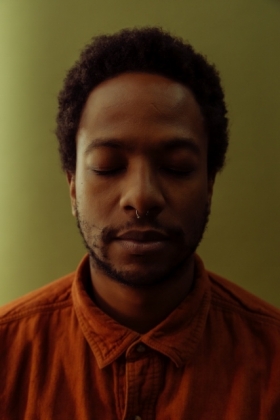

Third Album, with its tracks culled from work done over the past number of years, captures that spirit of progress and process. “Some of the songs are two years old, some of them were finished a year ago,” says Lake. “I had this realization that all of these things have led to the next step. I’m still personally trying to figure it out as well. But it seemed appropriate to try and put forward that idea that whenever you’re doing something, it’s based on everything you’ve done before.”
At its most essential, Third Album may simply be a record of sound— an exploration of texture and tempo, of the relationship between tones, of sensuous electricity. Lake, in his sound-based thinking and commitment to process, embodies this simplicity (when I ask him what’s kept him coming back to Markus Floats, I can hear him smile as he says it’s the only thing he knows how to do). But even as an exercise in pure physics—the inertia of the bass tones, the rebound of reverb—Third Album creates an environment rich in association and primed for deep thought. It is the sound of possibility, of surprise, and of the twisting musical traditions to investigate sound in its purest form. All that, of course, comes after the sound—once Lake’s music has reached the ears of a new listener, creating a new meaning all its own.
Photos by Stacey Lee; top image design by Hesh Jayawardena. "Forward Always" is included on the Musicworks 137 CD companion. More about Markus Floats here.
